Peter C. Herman, Professor of English Literature at San Diego State University, recently published “Terrorism and the Critique of American Culture: John Updike’s Terrorist” in Modern Philology 112: 4 (May 2015), 691-712.
Category Archives: Scholarship & Analysis
Daily Beast writer considers Updike’s Seven Stanzas at Easter
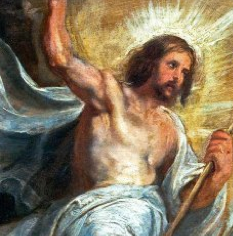 In a Daily Beast think-piece titled “Did Updike Sell the Resurrection Short?” writer Matthew Sitman considers Updike’s poem, “Seven Stanzas at Easter.”
In a Daily Beast think-piece titled “Did Updike Sell the Resurrection Short?” writer Matthew Sitman considers Updike’s poem, “Seven Stanzas at Easter.”
“The poem gains new life of its own every year around this time. It inevitably flits across social media as Holy Week draws to a close, a very quotable addition to the Facebook feeds of America’s more literary Christians. Updike’s words circulate in more traditional ways, too, giving pastors and priests just the rhetorical flourish they need for their Easter nominees. This Sunday, many churchgoers who’ve never read a page of Rabbit, Run will nod along at Updike’s verse.
“The force of ‘Seven Stanzas,’ however, goes beyond its seasonal affiliation. After all, there are other poems about Easter. Perhaps Updike’s resonates because it seems attuned to the nature of belief in the modern world—or rather, it asks the modern believer what she is willing to believe. The poem forces the reader to answer for herself what really happened in that backwater of the Roman Empire in the days after Jesus was executed as a criminal. There can be, to use Updike’s word, no ‘sidestepping’ this issue. Are you ’embarrassed’ by this ‘miracle’ or not?
“This is a perennial question, the place where all quests for the historical Jesus give way to faith—or not—and Updike is wrong not to remind us of its stakes. But for all his theological sophistication, and despite my admiration for his literary gifts, Updike’s poem leaves me unsatisfied. It achieves its existential urgency by skirting the complexity and strangeness of what the Gospels actually tell us about the resurrection. The poem is a blunt instrument, jarring and powerful, but it obscures as much as it reveals.
“Updike asks us to leave aside figurative language and interrogate the Gospel accounts of the resurrection for their literal truth, if it really happened or not. When we read these passages, however, they also should interrogate us, unsettling our judgments about what we think we know and how we understand what it meant for Jesus to rise from the dead. They defy all our inevitable attempts to escape the uncertainty of real faith and reduce the resurrection to a pat story that does little more than comfort those who encounter it.”
Sitman thinks it is a “sense of wonder at the sheer perplexity of what Jesus was like after his resurrection that seems to be missing from Updike’s ‘Seven Stanzas at Easter.’ The problem is not that Updike challenges us to consider the strange idea that a man rose from the dead; it’s that what he holds before us isn’t strange enough. Whatever is going on in the Gospels, it seems to resist the efforts of those who want to assimilate the Easter story either through a literalism uncomfortable with paradox or by turning it into a somewhat embarrassing myth meant to inspire hope.”
Read the full article.
See also: “A few minutes with Updike’s ‘Seven Stanzas at Easter,'” by Tom Grosh IV and a 2009 post recommended by Grosh, “On Easter and Updike” by David E. Anderson.
UC Observer on Begley’s bio and the Spirit of Updike
Member John McTavish recently published a review-essay of Adam Begley’s biography that also considers Updike’s spirituality.
In “The Spirit of Updike,” which appeared in the Culture section in the online version of The United Church Observer—which, according to its masthead, is “the oldest continuously published magazine in North America and the second oldest in the English speaking world”—McTavish notes that “faith was more than a pleasurable habit for Updike. It was an antidote to ‘existential terror,’ as Begley puts it. Updike himself admitted as much in his memoir Self-Consciousness: ‘Perhaps there are two kinds of people: those for whom nothingness is no problem, and those for whom it is an insuperable problem, an outrageous cancellation rendering every other concern, from mismatching socks to nuclear holocaust, negligible.'”
“Religion is virtually omnipresent in Updike’s work,” McTavish writes. “But this doesn’t mean that Updike’s fiction forces a Christian message on the reader. On the contrary, he always believed that his basic duty to God was to write the most truthful and fullest books he could. ‘I don’t want to write tracts, to be more narrow in my fiction than the world itself is; I try not to subject the world to a kind of cartoon theology which gives predictable answers,’ he once reflected. Fallen clergy, self-centered philanderers: no one escaped Updike’s penetrating eye.
“Perhaps Updike’s finest religious story is ‘Pigeon Feathers,’ about a teenage boy’s quest for faith amid panic over mortality,” McTavish concludes. “The awesome complexity of the humble pigeon’s feathers distills Updike’s own philosophy of writing: ‘to give the mundane its beautiful due,’ as he phrased it; to celebrate reality, both human and divine.'”
Schlemiel Theory: On Cynthia Ozick’s Denunciation of Henry Bech
They say there’s a blog about everything, and yesterday at The Home of Schlemiel Theory a writer going by the user name mfeuer2012 published a piece “On Cynthia Ozick’s Denunciation of Henry Bech: John Updike’s Literary Portrayal of the Jew as Schlemiel,” the title of which may go a long ways toward explaining.
 Ozick called Bech “theologically hollow” and according to the author “her reasons for choosing such a term and making such a trenchant criticism of Updike’s attempt to represent a Jew are noteworthy. They give us a sense of how Ozick—and others—might criticize many of the schlemiels we see in literature and film today. It also gives us a glimpse of her criterion for what makes for a plausible Jewish character in Jewish American fiction.”
Ozick called Bech “theologically hollow” and according to the author “her reasons for choosing such a term and making such a trenchant criticism of Updike’s attempt to represent a Jew are noteworthy. They give us a sense of how Ozick—and others—might criticize many of the schlemiels we see in literature and film today. It also gives us a glimpse of her criterion for what makes for a plausible Jewish character in Jewish American fiction.”
Citing other novels as well, the author writes, “Ozick’s gloss on these ‘de-Judaicized Jewish novelists’ foreshadows her rant on what is missing not just in Bech but in most Jewish writing today: knowledge of Jewish history. But this omission is not done out of neglect so much as what Ozick calls ‘autolobotomy.’ Wondering at this caricature of the Jew, Ozick suggests we think about how this would sound if this kind of portrayal were done with respect to real African-Americans.”
Later: “Updike, argues Ozick, loves Bech most when he is ‘thoroughly de-Beched’—when ‘Bech is most openly, most shrewdly, most strategically, most lyrically Updike’ (119). And this happens when the ‘Appropriate Reference Machine’ (ARM from here on) breaks down. At these moments of failure, Updike the theologian takes over.
“And in these moments, when the ARM breaks, there is a brief exposure to a Christeological kind of epiphany. However, this doesn’t transform Beck. Rather he returns to a kind of state that is . . . comical.”
Read the entire article.
Online essay considers John Updike’s Religion
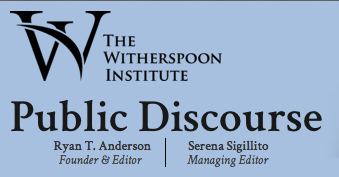 Recently The Witherspoon Institute Public Discourse website featured a post by Gerald R. McDermott in the “Literature, Religion and the Public Square” subsection on “‘A Rather Antinomian Christianity’: John Updike’s Religion.”
Recently The Witherspoon Institute Public Discourse website featured a post by Gerald R. McDermott in the “Literature, Religion and the Public Square” subsection on “‘A Rather Antinomian Christianity’: John Updike’s Religion.”
“How could a man be so religious and yet be so enthusiastic for infidelity?” McDermott asks.
“The answer seems to lie in his religion. It was a strange sort of Christianity that rejected the structures of traditional faith, choosing divine comfort while rejecting divine commands. In other words, it was gospel without law, grace without repentance, the love of God without the holiness of God.
“To be sure, Updike held on to parts of historic Christian belief. He rejected materialism as a failure to make sense of emotion and conscience, and defended Christ’s divinity against his first wife’s Unitarianism. At the same time, he took from Kierkegaard the idea that Christian faith is subjective, not a conclusion from rationality or objectivity. So he insisted that resurrection from the dead is ‘unthinkable’ to the modern mind, that God can be known only as ‘the self projected onto reality’ by our natural optimism, and that the closer one moves toward Christianity the more it disappears, ‘as a fog solidly opaque in the distance thins to transparency when you walk into it.’
“Updike’s Christianity was a religion of self-affirmation. His greatest fears were of death and its threat of nothingness. But religion, he wrote, ‘enables us to ignore nothingness and get on with the jobs of life.'”
Guardian offers a brief survey of the short story: Updike
 The Guardian Books Blog has been writing their version of “A brief survey of the short story,” and this past week writer Chris Power got around to John Updike. He writes that “there is enough Updike, with enough difference in quality, that you could plausibly read a lot of him without encountering a dud, and read just as much in another, unluckier direction without encountering anything particularly good. Few writers are more in need of a well-chosen collection of selected stories.”
The Guardian Books Blog has been writing their version of “A brief survey of the short story,” and this past week writer Chris Power got around to John Updike. He writes that “there is enough Updike, with enough difference in quality, that you could plausibly read a lot of him without encountering a dud, and read just as much in another, unluckier direction without encountering anything particularly good. Few writers are more in need of a well-chosen collection of selected stories.”
He’s right, actually. A single volume of “greatest hits” would be a sure contender for another Pulitzer Prize and make Updike the all-time leader in fiction Pulitzers. Right now he’s tied with Booth Tarkington and William Faulkner as the only American writers to win the prize twice.
Power, who says the “best place to begin is in Olinger,” concludes with a quote from Updike: “‘I cannot greatly care what critics say of my work,’ Updike said in 1968. ‘If it is good, it will come to the surface in a generation or two and float, and if not, it will sink.’ Much of his work, despite the nearly unfailing presence of a memorable simile, or pitch-perfect phrase, will disappear in time. Some—a small amount by Updike’s standards perhaps, but more than many can hope for—deserve the permanence we ourselves are denied.”
Updike and Kierkegaard spotlighted in a new book
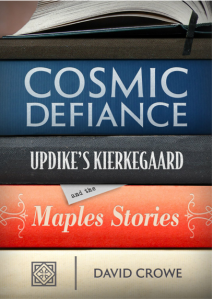 David Crowe, Professor of English at Augustana College, recently saw his book on Cosmic Defiance: Updike’s Kierkegaard and the Maples Stories published by Mercer Press.
David Crowe, Professor of English at Augustana College, recently saw his book on Cosmic Defiance: Updike’s Kierkegaard and the Maples Stories published by Mercer Press.
According to an article in the Aledo Times Record, Crowe tells the “story of Updike’s life-altering encounter with Fear and Trembling in his early career” and traces “the subsequent evolution of Updike’s complex and coherent theology.”
Crowe told the Times Record, “I wrote the book so that even people who haven’t read Kierkegaard can get up to speed on his central claims. Unlike most literary critics, I also avoid jargon and believe that if you can’t state a theory plainly and clearly you’re probably hiding something.”
George Hunt devoted a great deal of time and space to a discussion of Kierkegaard in his seminal work on Updike’s “three great secret things,” but this is the first book-length study on Updike and Kierkegaard.
We’ll post a review of the book on this site within the next week.
Writer publishes online pieces on Updike and David Foster Wallace
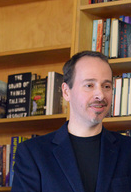 Writer-musician Art Edwards has published two online essays on Updike and David Foster Wallace:
Writer-musician Art Edwards has published two online essays on Updike and David Foster Wallace:
“David Foster Wallace was Wrong: Why John Updike Mattered and Always Will” appeared in the March 2013 issue of Word Riot. In it, the admitted Wallace fan says it annoyed him that “Wallace got so much wrong in his review of John Updike’s Toward the End of Time. . . . Wallace dismantles Time, and Updike’s character choices in many of his novels, and the ‘Great American Narcissists’ (Updike, Mailer, Roth) for their ‘radical self-absorption’ and ‘uncritical celebration of this self-absorption both in themselves and in their characters.'”
“I couldn’t agree more with Wallace’s assessment of Time,” Edwards writes. “I also found it to be ‘a novel so clunky and self-indulgent that it’s hard to believe the author let it be published in such shape.'” Edwards identifies himself as “the rare Updike fan of [his] generation, a group Wallace describes as under forty at the time of his review’s original publication (1997)” and says he’s read “twenty or so of Updike’s novels, many more than once,” and “loosely modeled” his first novel after Rabbit, Run.
He writes that Wallace’s “charges of Updike’s radical self-absorption are distracting from what’s wonderful about Updike’s work, and I suspect these charges will scare many of my and younger generations away from the writer. Wallace’s central charge is that Updike writes about one protagonist over and over again—all ‘clearly stand-ins for Updike himself’—and that the protagonist is ‘always incorrigibly narcissistic, philandering, self-contemptuous, self-pitying . . . and deeply alone, alone the way only an emotional solipsist can be alone.’
“To which I say, ‘Yeah, so?’ The literary canon is filled with writers who write about narcissists (Hemingway), and one character type over and over again (Austen), and characters who are self-pitying (Proust), and self-contemptuous (Beckett) and philandering (Miller). . . . What Wallace eels to mean is Updike’s characters are all of these things, and that makes them unsympathetic to him. And that’s where Wallace and I differ. I find all of Updike’s self-involved characters enormously sympathetic, often for the reasons Wallace mentions.”
“The Pot Calling the Kettle Narcissistic: The Lives and Works of John Updike and David Foster Wallace” appears in the Winter 2014 issue (dated January 15, 2015) of Cigale Literary and offers a further consideration of the two writers. Edwards says he continued his “education in Wallace” by working his way through “D.T. Max’s biography of the author Every Love Story is a Ghost Story,” and also rereading Updike’s Self-Consciousness.
“Updike was so under the spell of his country,” Edwards concludes, that “he had a notorious blind spot for a time when its motivations may have been less than savory. I’m referring to his famous marginal support of U.S. involvement in the war in Vietnam. . . . America was, for Updike, a safe haven, and to defend her, even in her atrocious moments—especially!—was his only way of paying back in kind,” he posits.
Of Wallace, he writes, “Wallace was as committed as he could be to combatting his nation’s addition to addictions. Around the time of Infinite Jest’s publication, he championed a more moral fiction, one that didn’t rely solely on dramatizing ‘how dark and stupid everything is.’ He continues, ‘In dark times, the definition of good art would seem to be art that locates and applies CPR to those elements of what’s human and magical that still live and grow despite time’s darkness.’
“These differences between Updike’s and Wallace’s points of view could easily be written off as differences in emotional makeup—and they were distinct in this regard—but others could have been more circumstantial. While neither writer went into the military (Updike was 4Fed for psoriasis, to his dismay; it’s hard to imagine Wallace ever seriously entertaining the idea of the military, their respective eras’ prevailing attitudes toward war were quite different. . . .”
Click on the essay titles to read the articles in full.
The Paris Review writes about Updike and cartoons
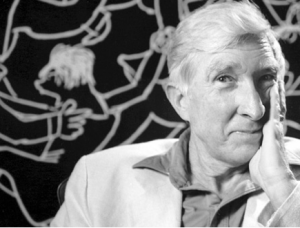 Updike fans know that he first aspired to be a cartoonist and was enamored with Disney, especially. And he was a fan of Big Little Books as a little fellow. But in a post today on The Paris Review website, Jeet Heer contemplates why John Updike loved comics and concludes, “While Updike might have ceased cartooning, the visual language of comics was never far from his mind.”
Updike fans know that he first aspired to be a cartoonist and was enamored with Disney, especially. And he was a fan of Big Little Books as a little fellow. But in a post today on The Paris Review website, Jeet Heer contemplates why John Updike loved comics and concludes, “While Updike might have ceased cartooning, the visual language of comics was never far from his mind.”
Heer writes, “A full inventory of the impact of cartooning on Updike’s writing would require a much longer essay. It would include a discussion of a poem that features Al Capp (creator of L’il Abner); Harry “Rabbit” Angstrom’s resentful affection for the girlie comic strip Apartment 3-G; the superhero references in the later Rabbit books; the story “Intermission,” about a young writer of comic strips; the novel Marry Me, which features a character who works in advertising animation; and the essays Updike devoted to cartoonists such as Ralph Barton, James Thurber, and Charles Schulz. Such a discussion would also look more deeply at the visual potency of Updike’s prose and also his habit of limning vividly grotesque secondary characters (think for example of the story “The Madman”), a fictional practice that owes as much to the tradition of caricature as to the model of Dickens.
Here’s the complete article: “Updike: Portrait of the Artist as a Young Fan”
Becoming John Updike now available in paperback
Larry Mazzeno’s book, Becoming John Updike, will be published in paperback the first week in February.
John Updike Society members and friends can take advantage of a 25 percent off offer from the publisher:
